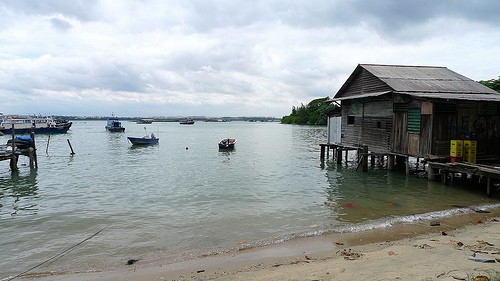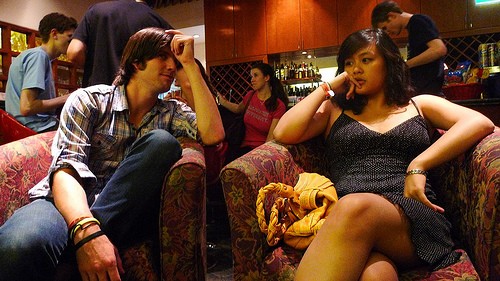Recently, the Columbia Journalism Review posted an article on (the lack of) press freedoms in Singapore.
Walk the streets of Singapore and you may think you’re in the world’s most modern country. But Singaporeans you’re pacing alongside who wish to speak freely about their country might not feel that way.
“In the entire world,” Fareed Zakaria has written, “there is only one country that has reached a Western level of economic development and is still not a fully functioning democracy—Singapore.”
In Spring 2009 I studied abroad at Nanyang Technological University’s Wee Kim Week School of Communications. I had a good time and got to travel throughout the region quite extensively. I learned more about journalism outside my classes than I did in my classes. I wrote a very wordy account of my experiences studying journalism in Singapore and I thought I would also share them here on my blog. Because the comment is so long, make sure to click the “Click Here to Continue Reading” button.
Last year I spent a semester studying journalism (a crazy thought, I know) at a university in Singapore. I wrote for the area/campus newspaper, was a producer for the campus TV network and hosted my own radio show on the school radio band. All of the teaching staff in the communications department were foreigners. My newspaper teacher was a print man from England, TV head was Taiwanese and the radio adviser was an American who worked for Clear Channel as a Top 40 DJ.
While it took a long time for me to wrap my head around the way things worked, I finally understood the nuance of it all by the time I left. In the end, it was fascinating semester learning how journalism worked in a society so shielded from the media. The big story that helped this epiphany was the apparent attempted murder-suicide by an international student from Indonesia on campus.
When news broke that a disgruntled student stabbed his professor, and then “jumped” nine floors to his death, things got understandably crazy. The government and administration stepped in and tried to stop our reporting. However, they knew the story was just too big to ignore. We had reports from students that the deceased student stabbed his professor, and in the altercation, the professor threw him over the balcony. It was never officially reported because we had people breathing down our neck. In the end, the story was simply a memorial for the student and a simple account of the official story. It was disappointing. The school went into saving face mode and set up ludicrous help lines, and counseling services to make it look like they cared.
I was one of two Americans in the class and the only one who ever argued at meeting for how journalism was “supposed” to work, I guess. I can’t count the number of times I fought my editors tooth-and-nail about how to approach a story. Asking a tough question was something the students were never taught. Questioning the system, especially as journalists, was something they just didn’t do. When someone said “no” to an interview, they gave up. The only way my professor kept from going crazy was to use his famously-dry wit.
After spending several long hours discussing journalism in Asia with my professor, he let me into some ideas that I never even considered, coming into the United States. The role of the media, as stated in the above article, is to make the government look good. If you make the government look bad, you are making the *people* look bad too. You are making the nation look bad as well. Given that most people perceive their city-state as fragile (they are in a weird delusional fear of Malaysia “retaking” the island), making the country look bad will be bad for everyone. And why would you want to make everyone look bad?
Another story I always remembered was a report students did on the rise of interracial marriages. Some students went around town interviewing interracial couples asking them how hard it was given the societal implications of their love. That part was good. Then, when it came to talking to students, the usual canned response was, “I would like to [date outside my race] but my parents won’t let me.” To me, they left out the most important question: “Yes, but would you encourage your children to only date in their race?” Without that question, the report fell flat and looks like a PSA. It could challenge the way people thought about interracial marriage as something beyond, “it’s good for those people, and the city, but not for me!” Discussing the social issues is out of the realm of thought for the students. It took me a long time to accept it, but it helped me get through my time there.
Race and religion are a huge point of contention in Singapore, which is why you can’t discuss them at the Speaker’s Corner. The author left out that you can’t discuss language there either. Dialectical debates never end for the Chinese majority. Even though Singapore has four national languages and an ethnic Chinese majority, there are a lot of people from different places who believe a lot of things. It’s actually one of the reasons why I loved the city so much. The food and culture are amazing, the government, not so much.
One reason LKY came into power was after the race riots in the 1950s. The riots were very bad and left a huge stain on the image of the island for a while. People looked to Lee to keep things together during what Singaporeans called, “a dark time.” It was the sort of, “we will keep things in order if you do what we say,” kind of deal.
I have a million other stories, like how the opposition party leader went and talked at the university and the government yanked the story at the last minute from the print. It was a big fight for my professor, but he ended up losing in the end. The article wasn’t even about what the guy’s principles were; it was an article that said this man “visited.” The retort from the PAP (People Action’s Party) was, “he was a trespasser on the university, that’s not news.”
Anyway. Sorry for the ramblings.




I research about that 10 universities and colleges in Singapore offer Journalism courses. Singapore is the best country for the Journalism study. There are so many job scope available after the journalism.
student travel